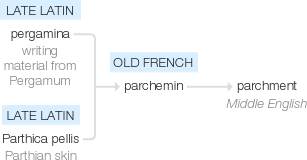Parchment
Middle English: from Old French parchemin, from a blend of late Latin pergamina ‘writing material from Pergamum’ and Parthica pellis ‘Parthian skin’ (a kind of scarlet leather).
wiktionary
From Middle English parchemyn, parchement, from Old French parchemin, via Latin pergamīna, from Ancient Greek Περγαμηνός(Pergamēnós, “of Pergamun”), which is named for the Ancient city of Pergamon (modern Bergama) in Asia Minor, where it was invented as an expensive alternative for papyrus. Cognate with Danish pergament, Dutch perkament, French parchemin, German Pergament, Greek περγαμηνή(pergaminí), Italian pergamena, Norwegian pergament, Portuguese pergaminho, Galician pergameo, Romanian pergament, Russian пергамент(pergament), Spanish pergamino, and Swedish pergament.
etymonline
parchment (n.)
c. 1300, parchemin (c. 1200 as a surname), "the skin of sheep or goats prepared for use as writing material," from Old French parchemin (11c., Old North French parcamin) and directly from Medieval Latin pergamentum, percamentum, from Late Latin pergamena "parchment," a noun use of an adjective (as in pergamena charta, attested in Pliny), from Late Greek pergamenon "of Pergamon," from Pergamon "Pergamum" (modern Bergama), the city in Mysia in Asia Minor where parchment supposedly first was adopted as a substitute for papyrus in 2c. B.C.E.
The form of the word was possibly influenced in Vulgar Latin by Latin parthica (pellis) "Parthian (leather)." The unetymological -t is an alteration in Middle English by confusion with nouns in -ment and by influence of Medieval Latin collateral form pergamentum. The technological advances that led to cheap paper restricted its use largely to formal documents, hence the sense of "a certificate" (by 1888).
